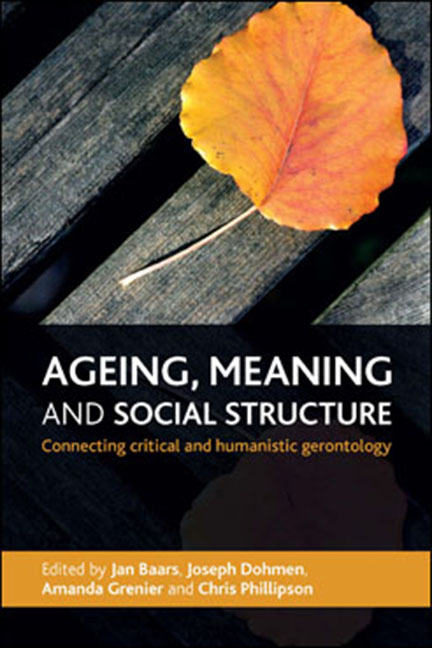Book contents
- Frontmatter
- Contents
- Notes on contributors
- Acknowledgements
- one Introduction
- two Connecting meaning with social structure: theoretical foundations
- three My own life: ethics, ageing and lifestyle
- four Rethinking agency in late life: structural and interpretive approaches
- five Dementia: beyond structures of medicalisation and cultural neglect
- six Self-realisation and ageing: a spiritual perspective
- seven Social ability or social frailty? The balance between autonomy and connectedness in the lives of older people
- eight Critical perspectives on social work with older people
- nine Community-based participatory action research: opportunities and challenges for critical gerontology
- ten Commentary: contingent ageing, naturalisation and some rays of intellectual hope
- Index
ten - Commentary: contingent ageing, naturalisation and some rays of intellectual hope
Published online by Cambridge University Press: 07 September 2022
- Frontmatter
- Contents
- Notes on contributors
- Acknowledgements
- one Introduction
- two Connecting meaning with social structure: theoretical foundations
- three My own life: ethics, ageing and lifestyle
- four Rethinking agency in late life: structural and interpretive approaches
- five Dementia: beyond structures of medicalisation and cultural neglect
- six Self-realisation and ageing: a spiritual perspective
- seven Social ability or social frailty? The balance between autonomy and connectedness in the lives of older people
- eight Critical perspectives on social work with older people
- nine Community-based participatory action research: opportunities and challenges for critical gerontology
- ten Commentary: contingent ageing, naturalisation and some rays of intellectual hope
- Index
Summary
Introduction
We begin this commentary by underscoring the usefulness of the distinction made by Jan Baars and Chris Phillipson in Chapter Two, between contingent and existential ageing. As they define these terms, contingent ageing refers to ‘… limitations that are neither inherent in human life nor inevitable in senescing …’, while existential ageing refers to ‘vulnerabilities that are inherent in human life and will manifest themselves inevitably as people live longer.’ This important distinction resurfaces in a number of complex ways throughout the chapters of this volume, and we employ it as one of two organising themes for this commentary chapter. The enduring theme of the tension between theory and practice arises in fresh ways in several of the chapters, and we focus on this tension as a second organising theme for our comments. We serially adopt these two sets of tensions – between (a) contingent and existential ageing and (b) theory and practice – as the primary frameworks within which to organise our comments on this set of informative and provocative chapters.
Contingent and existential ageing
Before proceeding to a discussion of individual chapters with reference to the contingent/existential distinction, the distinction itself warrants some further clarification and elaboration. First, we note the contingent/existential distinction largely reflects a social science/humanities divide, especially if one begins from a critical social science orientation. Social science seeks to explicate the role of social and institutional forces in shaping both culture and individual lives, including individual ageing. It is thus inherent in the logic of this approach to interrogate not just individual outcomes and individual differences but also their sources, and to explore whether variation across individuals may be accounted for in the social contexts within which the individual in question is immersed. By contrast, humanities scholars often tend to focus most fundamentally on the character of the experience and explore its depths, dimensions, boundaries and possibilities on its own terms.
Second, as we understand these terms, neither contingent nor existential ageing need be seen as inherently limited to ‘limitations’ and ‘vulnerabilities’.
- Type
- Chapter
- Information
- Ageing, Meaning and Social StructureConnecting Critical and Humanistic Gerontology, pp. 181 - 196Publisher: Bristol University PressPrint publication year: 2013
- 1
- Cited by

